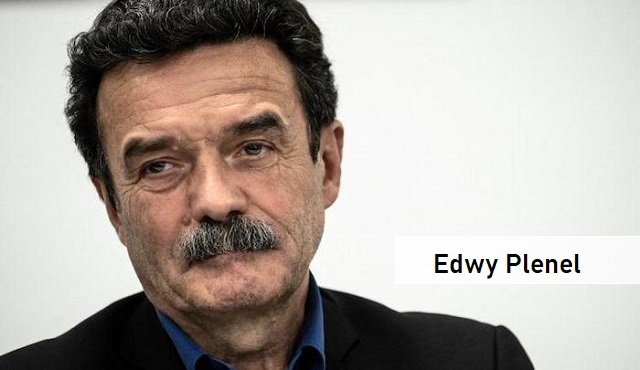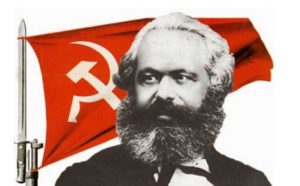Though it may seem strange, Karl Marx was not always a communist. As late as 1842, when Marx was in his mid-20s, he actually said he opposed any attempt to establish a communist system. In October 1842, he became editor of the Rheinische Zeitung [the Rhineland Times], and wrote in an editorial:
The Rheinische Zeitung … does not admit that communist ideas in their present form possess even theoretical reality, and therefore can still less desire their practical realization, or even consider it possible.
In 1843, Marx was forced to resign his editorship because of political pressure from the Prussian government and ended up moving to Paris. It was in Paris that he met his future lifelong collaborator, Friedrich Engels (who already was a socialist), and began his deeper study of socialism and communism, leading to his full “conversion” to the collectivist ideal.
Feuerbach and the Worship of Man Perfected
From his student days in Berlin, two German philosophers left their imprint upon Marx: George Hegel (1770-1831) and Ludwig Feuerbach (1804-1872). From Hegel, Marx learned the theory of “dialectics” and the idea of historical progress to universal improvement. From Feuerbach, Marx accepted the idea of man “perfected.” Feuerbach had argued that rather than worshiping a non-existing supernatural being – God – man should worship himself.
The “true” religion of the future should, therefore, be the Worship of Mankind, and that man “perfected” would be changed from a being focused on and guided by his own self-interest to one who was totally altruistic, that is, concerned only with the betterment of and service to Mankind as a whole, rather than only himself.
Marx took Feuerbach’s notion of man “perfected” and developed what he considered to be the essential characteristics of such a developed human nature. There were three elements to such a perfected human being, Marx argued:First, the Potential for “Autonomous Action.” This is action undertaken by a man only out of desire or enjoyment, not out of necessity. If a man works at a blacksmith’s forge out of a desire to creatively exercise his faculties in molding metal into some artistic form, this is free or “autonomous action.” If a man works at the forge because he will starve unless he makes a plow to plant a crop, he is acting under a “compulsion” or a “constraint.”
Second, the Potential for “Societal Orientation.” Only man, Marx argued, can reflect on and direct his conscious actions to the improvement the “community” of which he is a part, and which nourishes his own capacity for personal development. When man associates with others only out of self-interest, he denies his true “social” self. Thus, egoism is “unworthy” of a developed human being.
And, third, the Potential for “Aesthetic Appreciation.” This is when man values things only for themselves; for example, “nature for nature’s sake,” or “art for art’s sake.” To view things, Marx claimed, only from the perspective of how something might be used to improve an individual’s personal circumstance is a debasement of the “truly” aesthetic value in things.
Capitalism Keeps Man from Perfection
Feuerbach believed man was “alienated” from himself when he was not “other-oriented.” To change from self-interest to altruism was mostly a state of mind that man could change within himself, Feuerbach argued. Marx insisted that the problem of “alienation” was not due to a person’s “state of mind,” but was conditioned by the “objective” institutional circumstances under which men lived. That is, the political, social, and economic institutions made man what he is. Change the social order, and man would be changed. “Capitalism,” Marx declared, was the source of man’s alienation from his “true” self and his human potential.
How did this “alienation” manifest itself?
Capitalism, Marx declared, was the source of man’s alienation from his “true” self and his human potential.
First, there is the Stifling of Autonomous Action. In the marketplace, forces “outside” the control of the individual determine what is produced and how it is produced. The individual “reacts” to the market, he does not control it. Thus, market forces are external constraints on man. He responds to the market out of “necessity,” not out of free desire.Furthermore, to enhance production and productivity, man is “forced” to participate in a division of labor to earn a living that makes him an “appendage” to a machine, a “slave” to the machines owned by the “capitalists” for whom he is “compelled” to work.
Second, there is Diminished Other-Orientedness. In the market, the individual sees others only as a means to his material ends; he trades with others to get what he wants from others, merely in pursuit of his own self-interest. Work is not considered a communal “cooperative” process, but an antagonistic relationship between what the individual wants and what is wanted by the one with whom he trades.
Third, there is Limited Aesthetic Appreciation. In the market, people see nature, resources, and the creations of man not as things to be intrinsically valued in themselves, but as marketable objects – as means – to personal ends. Acquisition of things – possessiveness – becomes the primary goal of economic activity for making a living.
Communism’s Liberation of Constrained Man
Communism, through collective planning, would make work an “autonomous” act, rather than “constrained action.” When democratically regulated by the workers as a whole, Marx asserted, collective planning would emerge from the desires of all the members of society as their communal choice and consent. It would be consciously planned and directed through the participation of all the members of society, thus generating an “other-oriented” sense of a “common good” for which all worked.
No one would be forced and constrained to do what another made them do in the division of labor anymore. Indeed, communism would free men from the “tyranny” of specialization. In Marx’s words, from The German Ideology (1845),
In communist society, where nobody has one exclusive sphere of activity but each can become accomplished in any branch he wishes, society regulates the general production and thus makes it possible for me to do one thing today and another tomorrow; to hunt in the morning, fish in the afternoon, rear cattle in the evening, criticize after dinner, just as I have a mind.
In this new communist world, no one will have to work at anything he did not like or want to do. In addition, under communal planning, production would rise to such a height of productivity that the work day would be shortened to the point that each person’s time would be free to do only the things he enjoyed doing.
Selfishness would be eliminated as a human trait, and altruism would become the dominant trait.
Communism would also enhance social consciousness and other-orientedness. All that was communally produced would be distributed on the basis of “need” or “want.” No longer would scarcity impose constraints on man’s desires. As a result, the urge for “possessiveness” and acquisition of “things” would diminish and finally disappear. Selfishness would be eliminated as a human trait.Others would no longer be viewed as “competitors” for scarce things, but as social collaborators for attaining “higher” ends of social importance. Altruism would become the dominant trait in man.
In addition, communism would result in the flowering of aesthetic appreciation.
Man would not create so he could earn a living, but for the pleasure of the activity itself. Work would not be a source of “alienation” but an activity reflecting the free – the “autonomous” – desires of man for the “beautiful.”
Communism would liberate man in all ways and all things, said Marx:
With a communist organization of society, there disappears the subordination … of the individual to some definite art, making him exclusively a painter, a sculptor, etc. … In a communist society, there are no longer painters, but only people who engage in painting among other activities.
With the end of capitalism and the arrival of communism, there would come a heaven on earth. There would be enough of everything for all. Man would be freed from working for survival, he would be unchained from the division of labor, he would be liberated to follow whatever gave his heart pleasure. With Communism, man becomes like God – free and powerful to do whatever he wants.
Marx’s Denial of Self-Oriented Human Nature
Let me suggest that what Marx was objecting to – revolting against – was human nature and the existence of scarcity. Man can never escape from or get outside of being an individual “ego.” We exist as individual human beings; we think, remember, imagine, choose, and act as distinct and unique individual men and women.
Our experiences are our experiences; our thoughts and beliefs are our reflections and ideas; our judgments and valuations are our estimates and rankings of things of importance to us. Even when we try to put ourselves in another person’s shoes, to try to sympathize, empathize, and understand the meanings, experiences, and actions of others, it is from our perspective and state of mind that we do so.It is the individuality of the person in these and other facets of our distinct nature and character as conscious, conceptualizing creatures that make for the unique differences and diversities of our minds as self-oriented human beings. This is the source of the creativity and plethora of possibilities that can and have emerged from seeing the world in the distinct and different ways of self-oriented and self-experiencing people when pursuing their own improvement. As they consider what is most advantageous for themselves and others they “selfishly” care about, they support and encourage an institutional setting of peaceful and voluntary market association.
Marx’s Denial of the Reality of Scarcity
Marx also objects to the reality of the necessity to have to produce in order to consume and to have to view one’s own labor as a means to various ends, rather than simply being somehow provided with all that we want and our labor being “free” to be used as a pleasurable end in itself.
Likewise, he revolts against men viewing each other as a means to their respective desired ends rather than as purely human relationships, a “club” in which all get together and freely associate for “good times” with no concern for how or who provides the things without which good times cannot occur.
Nor can he abide men looking upon nature and man-made objects as the means or tools of producing the necessities, amenities, and luxuries of life, with the assignment of a “money value” to a house, a work of art, a waterfall, or a sculpture being “dehumanizing” for Marx.
However, the only reason such things are given values by people in society is that they are wanted but also scarce and because the means to achieve them are scarce as well. As a consequence, we must decide what we consider to be more or less valuable and important to us since all that we would like to have cannot be simultaneously fulfilled at the same time.
Marx’s hatred for the division of labor is an outgrowth of this worldview. Man is seen as somehow less than whole by specializing in a task and selling both his labor and his fraction of the total output to achieve the ends and goals he considers more important than what he has to give up in return.
Marx’s Misconception of Action and Choice
The entire Marxian conception of man, society, and happiness can be conceived, therefore, as a flight from reality. It can be seen in Marx’s distinction between “autonomous action” and capitalist “choices.”
“Action” is, in fact, nothing more than choice manifested: we undertake courses of action only after we have decided what it is we wish to do. That is, we decide which among the alternatives available to us we shall try to bring about, and which shall be set aside for a day or forever because not everything we desire can be had, due to the constraints of nature and the existence of other human beings.
Marx talks of people fishing in the morning and hunting in the afternoon – does that not mean that the person’s time is scarce? Is he not “frustrated” that he cannot do both at the same time, or be in two places at once?
“Action” is, in fact, nothing more than choice manifested.
If every man is to be “autonomously free” to hunt and fish whenever and to whatever extent he desires, what happens when the various members of the community wish to kill the forest animals or catch the fish at such a rate that they are threatened with extinction? Or what if several people all want to fish from the same place along the river or lake bank at the same time, or from the same “cover” position while out hunting?Marx might say that a “societal orientation” on the part of everyone would result in some form of “comradely” compromise. But is that not just other language for “mutual agreements,” “trade-offs,” and “exchanges” concerning the use and disposal of scarce resources – the disposition of the communal property rights among the members of society?
There is no certainty that all of the members of such a society will always like the communally agreed-upon outcomes, with some of them considering themselves “exploited” for the benefit of others who have out-voted them. And, therefore, they may be “alienated” from their fellow men and from nature even in the communist paradise to come.
Nor can there simply be the idea of art for art’s sake or nature for nature’s sake.
Resources for art and gifts of nature (unless cultivated to expand them) are always limited. The use of forests for primitive contemplation versus industrial use versus residential housing would still have to be made in Marx’s magical communist society. And, certainly, not everyone in the bright, beautiful communist society may agree or like the decisions that a majority of others in the blissful societal commune make about such things.
The paint for the artist’s pallet is not in infinite supply, so some art would have to be forgone so other art might be pursued; similarly with the ingredients going into the manufacture of paints versus being used for other things. To assume that men would never conflict over how to dispose of these things is to escape into a complete fantasyland.
Also, it is a physical and psychological fact that men differ in their relative capacities and inclinations in terms of various tasks needing to be performed. It is a physical and psychological fact that men tend to be more productive when they specialize in a small range of tasks as opposed to trying to be a “jack-of-all-trades.”
The Reality of Communism Versus the Reality of Capitalism
As a result, the division of labor raises both the productivity and the total production of a community of men, standards of living rise, leisure time can be expanded, and more variety and quality of goods can be produced.
Indeed, it has been free market capitalism that has provided humanity over the last 200 years with that actual relative horn-of-plenty wherever a fairly free rein has existed for self-interested individual action in pursuit of profit in associative relationships of specialization based on the peaceful use of private property.
Capitalism has been the great liberator of ever more of mankind from poverty, want, and worry. It has freed people from the hardship and drudgery of often life-threatening forms of work. The free market has shortened the hours of work needed to generate levels of material and cultural comfort for a growing number of people and provided the longer, healthier lives and increased leisure time for people to enjoy the wealth that economic freedom has made possible.The “de-alienation” of man from his everyday existence, in the sense that Marx talked about it, has also, in fact, been brought about through the achievements of capitalism. It has relieved more and more of mankind from the concerns of mere survival and subsistence through the capital accumulation and profit-oriented production that has raised the productivity of all those who work and expanded the available supply of useful goods and services. The free market has enabled people to have the means to fulfill more of the enjoyments and meanings of life as ends in themselves.
Furthermore, as Austrian economist F. A. Hayek and others have pointed out, the advantage of the free market system is precisely that it does not require all of the members of the society to agree upon and share the same hierarchy of goals, ends, and values. Each individual, under competitive capitalism, is at liberty to select and follow their own purposes and pursue happiness in their own way. Using each other as the voluntary means to their respective ends in the arena of peaceful market exchange allows a much larger diversity of outcomes reflecting differences among people than if one central plan needs to imposed on all in the name of the interests of a collectivist community as a whole.
Marx’s flight from reality, on the other hand, was the wish to have everything capitalism, the division of labor, and competitive exchange can produce, but without the cost of work, discipline, specialization, and selecting among alternatives. It is like the cry of the child who refuses to accept the fact that he cannot have everything he wants, right there and then and, instead, expects someone or something to provide it to him and everyone else in a blissful fairyland of material plentitude.

Richard M. Ebeling is BB&T Distinguished Professor of Ethics and Free Enterprise Leadership at The Citadel in Charleston, South Carolina. He was president of the Foundation for Economic Education (FEE) from 2003 to 2008.









